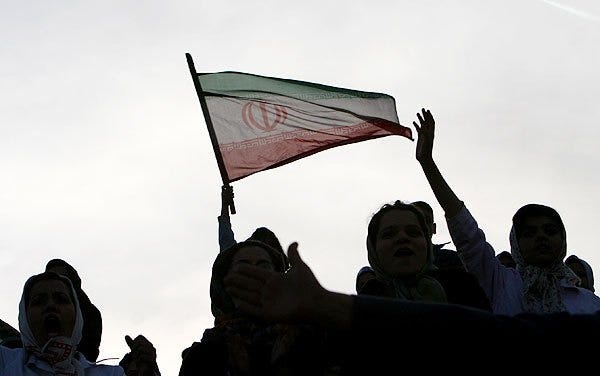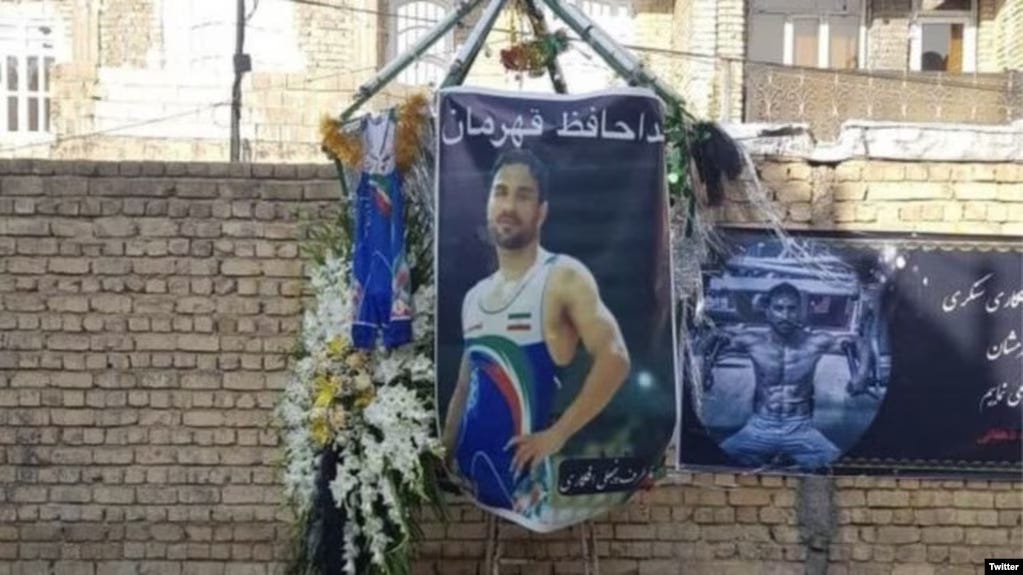How Iran's sports federations molded the regime's brutal forces
Members of a government-funded militia known for brutally suppressing dissent are currently positioned within Iran’s combat sports federations.
Exactly one year ago, Iran’s so-called morality police detained and tortured a a 22-year-old Kurdish-Iranian woman—Mahsa Jina Amini—for allegedly showing too much hair beneath her compulsory veil. She died in custody on Sep. 16, triggering Iran’s longest anti-government protests since the 1979 revolution that transformed the country into an Islamic theocracy.
In the wake of Amini’s death, the country’s security forces have used savage tactics to suppress anti-government demonstrations and crush dissent. More than 20,000 people were arrested and over 500 were killed. This remains the case as the country mark’s the first anniversary of Amini’s death, with riot police being deployed across various provinces in anticipation of flare-ups in protests. In recent weeks, Iranian and Western human rights organizations have also revealed that journalists, lawyers, activists, and members of ethnic minorities accused of having ties to the protest movement have been arrested or faced various forms of intimidation.
Though Iran’s security forces have long been known for their ruthless approach to suppressing protests, few are aware of the role that Iran’s martial arts federations have played in training the regime’s brutal forces.
Several members of the Fatehin (Conquerors) Special Unit—an all-volunteer militia attached to the Islamic Revolutionary Guard Corps—are currently positioned within Iran’s martial arts federations. The unit is regularly deployed to quell protests and suppress unrest in Iran. The unit has also been deployed to other countries, including Syria.
The vice president of Iran’s kick-jitsu committee, Mohammad Yaran, is a senior members of the Fatehin Special Unit and has been regularly pictured alongside the unit’s commander.
Prominent kick-jitsu athlete Mohsen (Siamak) Baghban Khorrami, is also a member of the Fatehin Special Unit. He also heads a training center that teaches a Russian hand-to-hand combat style known as Systema Spetsnaz. He was taught by Vadim Starov, the president and chief instructor of the Systema Spetsnaz International Training Center who also happens to be a former member of the Russian Special Operations Forces. Now, Khorrami uses his knowledge to train Iran’s security forces in the Russian martial art to further enhance their suppression tactics.
Meanwhile, Iran’s Judo Federation appointed Hassan Kordmihan—a militant cleric who was the alleged mastermind behind the 2016 attack on the Saudi mission in Tehran—as the head of the federation’s cultural committee in 2020. He also serves as an adviser to the federation’s president.
Kordmihan runs his own judo club called Ali Heydar, which is reportedly used as a recruitment centre for the Fatehin Special Unit in southern Tehran.
“Many of the thugs who cooperate with the government are recruited through martial arts clubs,” said judoka champion Vahid Sarlak, a former member of Iran’s national judo team who is now a legal resident of Germany. “Either they offer them a position at a federation or give them a club and, in exchange, they recruit for security agencies or directly participate in suppressing protests.”
Months after Kordmihon’s appointment, the World Judo Federation suspended Iran’s Judo federation for four years after the regulatory body’s disciplinary committee found that the federation had forced Iranian judoka Saeid Mollaei to deliberately lose a round in the 2019 World Championships so he would not have to compete against an Israeli player. Mollaei has since claimed asylum in Europe.
Furthermore, a former bodyguard and close confidant of Iran’s Supreme Leader Ali Khamenei was named the president of the country’s National Olympic Committee. According to IranWire, a website run by professional Iranian journalists in the diaspora and citizen journalists inside Iran, this appointment means that “Iranian sports and athletes will continue to be sacrificed on the altar of Islamic ideology.”
It is also worth noting that the chairman of Iran's Martial Arts Associations Federation Yousef Behtari signed an agreement to create martial arts groups within Iran’s police force, further cementing the relationship between martial arts and government oppression in Iran.
In April 2022, Behtari held a meeting with the president of the International Mixed Martial Arts Federation (IMMAF), Kerrith Brown, to reportedly discuss Iran hosting an upcoming edition of the IMMAF Asian Championship. This would effectively mean that the international governing body for amateur MMA would be partnering with a federation actively working with the regime’s brutal forces.
While Iran’s ruling regime continues to recruit combat sports athletes for its militant forces, the government has not shied away from executing combat sports athletes who oppose them.
In 2020, Iran executed champion wrestler Navid Afkari despite outcries from the likes of U.S. President Donald Trump, UFC President Dana White, and the International Olympic Committee.
Afkari was sentenced to death for his alleged role killing a security officer in Shiraz, Fars Province during summer 2018 protests in the province. However, according to Center for Human Rights in Iran (CHRI), there is evidence that he did not commit the alleged crime and that he was tortured during interrogation into giving a false “confession.”
Trump tweeted at the time: “Hearing that Iran is looking to execute a great and popular wrestling star, 27-year-old Navid Afkarai, whose sole act was an anti-government demonstration on the streets. They were protesting the “country’s worsening economic situation and inflation”
Amin Bazrgar, another Iranian wrestler, went missing in August 2021, a day after he took to Instagram to protest the September 2020 execution of Afkari.
Three years later, amid the country’s crackdown on protests following Amini’s death in custody, Iran executed Mohammad Mehdi Karami, a karate champion for taking part in the anti-regime protests.
Karami—an Iranian-Kurdish karate champion—was not given final rights to speak to his family before execution. Karami was convicted on Dec. 5 in a sham trial that human rights group Amnesty International said “bore no resemblance to a meaningful judicial proceeding. His lawyer, Mohammad Hossein Aghasi, also revealed that Karami had begun a dry food hunger strike in protest against his sentence.
In December, Karami’s parents posted a video to social media begging Iran’s regime to spare his life.
“My son is among the karate champions of Iran and has several national titles and was the fourth ranked member on Iran’s national team,” his father said at the time. “I beg of you to please lift the execution order.”
Sports Politika is a newsletter about the intersection of sports, power and politics. If you like what you see, upgrade to a paid subscription ( or gift a subscription if you already have your own). We would appreciate if you could also like the post and let us know what you think in the comment section below.






Great article but wth is kick-jitsu??
Indeed, I have written about it